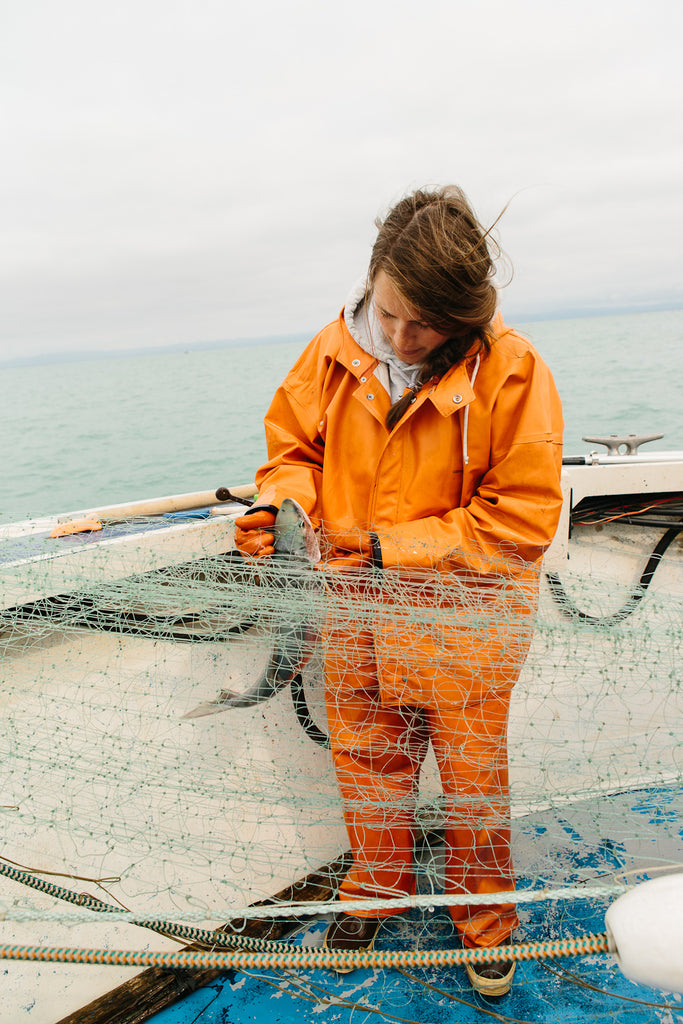Skagit County Herald
Nelly and Michael Hand have taken the idea of community-supported agriculture a step farther.
The Guemes Island couple are owners of Drifters Fish, a community-supported fishery. Instead of connecting families with local farms for fresh produce, they do the same with fish.
In previous years, the Hands always saved some of their catch for friends and family, but they have since decided to broaden that to a larger market, Nelly Hand said.
“We wanted to connect more people to the fish we caught so people know that it was taken care of,” she said.
After selling to processing and cannery companies for several years, the Hands launched Drifters Fish two years ago.
Every fishing season, they head to Cordova, Alaska, a small fishing town at the foot of white-capped mountains. The town comes to life in the spring with 500 boats clustered together in the harbor for fishing season.
Drifters Fish is a small operation. Nelly and Michael Hand work alone on their 31-foot boat, The Pelican, and catch 2,000 to 5,000 pounds of Pacific salmon a week during the season.
While it’s an industry they’re passionate about, neither expected to make a full-time career out of it.
Nelly Hand, an Alaska native, worked on fishing boats her whole life. Michael Hand is originally from New Hampshire and started commercial fishing 10 years ago.
She majored in art history and imagined a life working in museums. He majored in communications and business and had no idea what he wanted to do after college.
The two met while working on separate fishing boats in Alaska after they had graduated from college.
“I used to have to walk by the boat he worked on to get to my dad’s each day,” Nelly Hand said.
Now they’ve been married for two years in October and have been together seven years total.
While they still sell some of their catch to canneries and processors, they have more direct-market customers in the restaurant and grocery industries, farmers markets and individuals through their community-supported fishery program.
“It’s really cool to catch a wild protein for people,” Nelly Hand said. “I love being (out on the boat) knowing that I’m going to catch a fish for this person and it’s going to feed their family.”
Selling to the direct market has better profit margins, and it’s the portion of the Hands’ business they want to expand.
Michael Hand said they had 25 to 30 community-supported fishery customers last year and also started selling to Adrift, an Anacortes restaurant.
They save a portion of their catch for customers who may not know about their community-supported fishery program. Those who subscribe receive a box of frozen salmon in September after the season has ended.
Community-supported fisheries are popular on the East Coast but have been slow to get going on the West Coast.
Right now, the Hands’ customer base for their community-supported fishery is in Anacortes, Bellingham and Seattle.
“We’re still new at this and learning how to do it all,” Michael Hand said. “There are people (in Alaska) that have been doing it for 30 to 40 years and so there are lots of people to look up to.”
“That’s another thing that keeps us going — the people in the cannery, the other fishermen and the fishermen’s wives who are at home knitting sweaters for their husbands on the boat,” Nelly Hand said.
While they Hands always looking for more local opportunities, they don’t want to grow too much. Being hands-on is an important aspect of the business, Michael Hand said.
The Hands want their community-supported fishery to remain a personal experience between them and their customers.
← Back to Stories